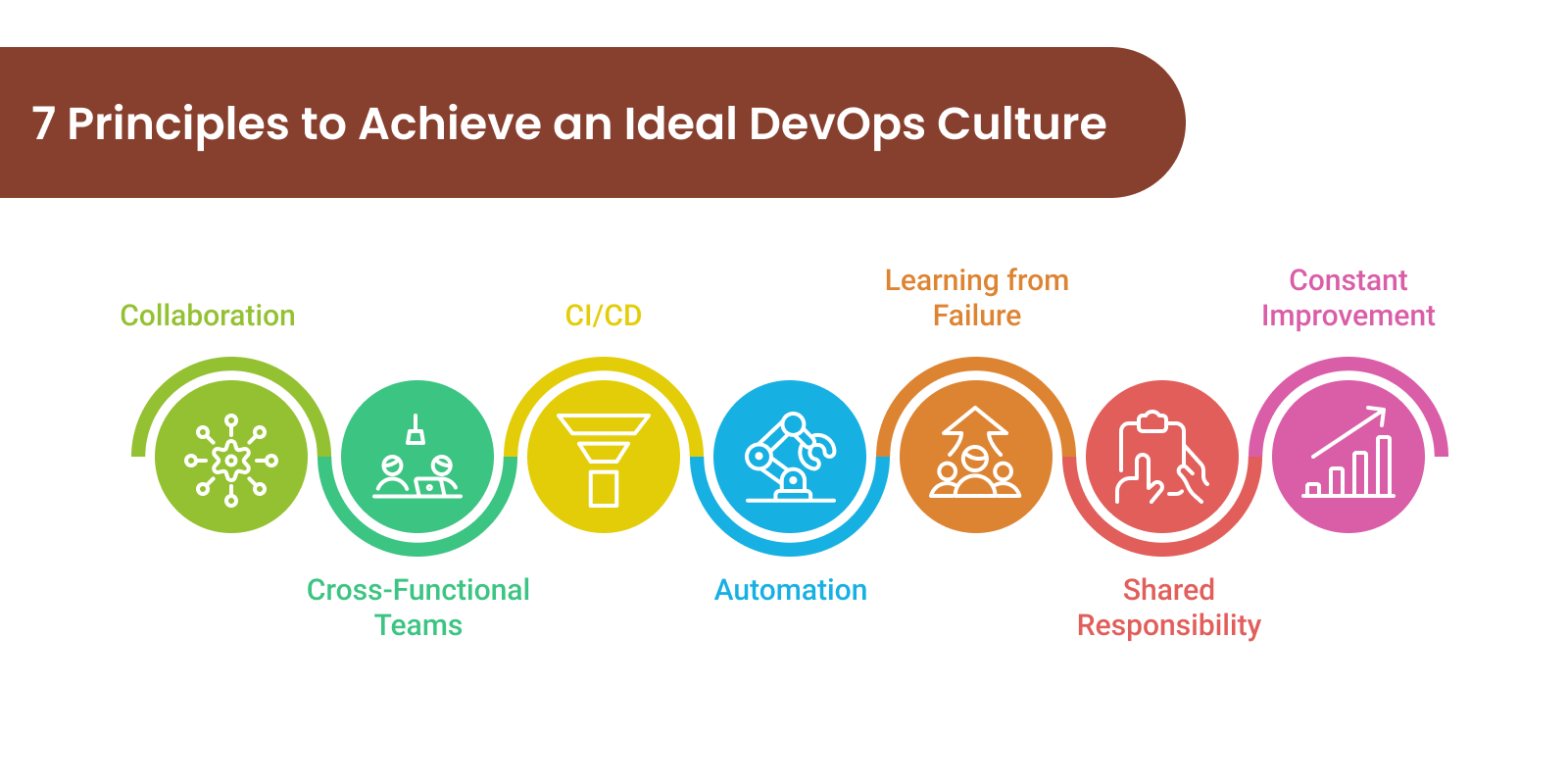7 Principles to foster an Ideal DevOps culture
Introduction

In today’s fast-paced tech world, organizations are constantly striving to deliver software faster, more reliably, and with higher quality. DevOps has emerged as a key approach to achieving these goals, bridging the gap between development and operations teams.
It’s more than just a set of practices—it’s a cultural shift that emphasizes collaboration, automation, and continuous improvement.
Adopting DevOps principles helps teams release software efficiently, respond to customer needs quickly, and reduce downtime, making it essential for modern software development.
What is DevOps?
DevOps combines development and operations to streamline software delivery. It’s a culture, set of practices, and mindset that encourages close collaboration between development and operations teams to release high-quality software efficiently.
By breaking down traditional isolated teams, DevOps enables teams to deliver value faster, automate processes, and improve overall productivity.
At its core, DevOps is about working together to create a seamless flow from idea to implementation.
7 Principles to Achieve an Ideal DevOps Culture

1. Collaboration
An essential part of DevOps is collaboration. This means creating an environment where teams feel comfortable sharing ideas and working together toward a common goal.
Developers, operations, and other stakeholders need to communicate openly and regularly, breaking down walls between departments.
Encouraging collaboration leads to quicker problem-solving and a better understanding of each team's challenges and strengths.
2. Embrace Cross-Functional Teams
Cross-functional teams are groups that include members from various departments, such as development, operations, testing, and security.
These teams bring together diverse perspectives and skills, allowing faster and more efficient problem-solving.
By working together closely, team members can address challenges in real-time, making the entire development process smoother and more responsive.
3. Foster Continuous Integration and Continuous Delivery (CI/CD)
CI/CD is the backbone of DevOps, enabling teams to integrate code changes frequently and automate testing. With CI/CD, new features and fixes are released to production quickly and safely.
This approach minimizes the risk of large-scale failures and allows teams to detect and address issues early.
CI/CD fosters a culture of continuous improvement, where small, regular updates replace the stress of infrequent major releases.
4. Automation
Automation in DevOps isn’t just helpful, it’s necessary. By automating repetitive tasks such as testing, code deployment, and monitoring, teams can focus more on high-value tasks.
Automation speeds up processes and reduces human error, leading to faster and more reliable deployments.
From code integration to infrastructure provisioning, automation keeps the workflow consistent and predictable, boosting productivity across the board.
5. View Failures as Stepping Stones
Failures are bound to happen, especially when moving fast.
A successful DevOps culture views failure as an opportunity for learning, not blame. Teams should analyze what went wrong, share insights, and make adjustments to prevent similar issues in the future.
This principle promotes resilience and encourages innovation since teams aren’t afraid of trying new approaches and learning from mistakes.
6. Promote Responsibility
In DevOps, everyone shares responsibility for the product’s success. This means developers, testers, and operations staff take ownership of their parts of the process.
This sense of accountability ensures that each team member feels invested in the project's outcome.
By empowering individuals to make decisions and take responsibility for their work, organizations can foster a culture of trust and quality.
7. Constant Improvement
The journey of DevOps is one of continuous improvement. Regularly reviewing processes, gathering feedback, and setting goals for improvement can drive the entire team forward.
Constant improvement pushes teams to optimize workflows, find new efficiencies, and improve the quality of their software.
It also keeps the team dynamic and adaptable, ready to evolve with changing technology and customer needs.
Conclusion
Building an ideal DevOps culture takes time, commitment, and continuous effort.
By fostering collaboration, embracing cross-functional teams, automating processes, and viewing failure as a learning opportunity, organizations can create a DevOps culture that drives efficiency and innovation.
With these principles, DevOps becomes more than just a set of practices, it becomes a transformative force that empowers teams to work smarter and deliver value faster.
